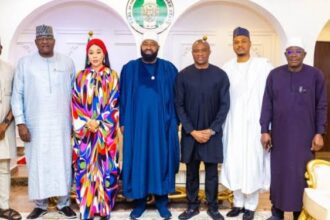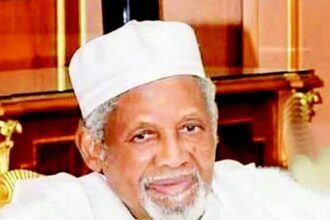...To get all news updates, Join our WhatsApp Group (Click Here)
Also Join our WhatsApp Channel (Click Here)
United Bank for Africa (UBA) Plc, the pan-African financial services group, operating in 19 African countries, has released its audited 2016 full year results, showing significant growth in gross earnings and profits, an attestation to its resilience, enhanced productivity and geographic diversification, evident in the impressive contribution from its African subsidiaries.
The Group recorded an impressive 22 percent growth in gross earnings to N384 billion, as at December 2016, from N315 billion at the end of the 2015 financial year, illustrating the Bank’s ability to grow profitability despite the difficult macro-economic environment. In addition to the rising adoption of electronic banking channels in many of the African markets, where UBA operates, the Bank leveraged its strong franchise and geographical footprint.
As reflected in the results released on March 24, 2017 at the Nigerian Stock Exchange (NSE), covering the period January to December 2016, the Group saw a significant 32 percent growth in profit before tax to N91 billion, compared to N68 billion profit recorded over the same period of 2015. UBA’s profit after tax grew by 22 percent to N72 billion, from N60 billion recorded the previous year. The performance was buoyed by considerable growth in both interest and non-interest income, as well as increasing efficiency gains from cost management initiatives. UBA’s subsidiaries outside of Nigeria are increasingly gaining market share, reinforcing the strong and impressive subsidiary contribution to the Group, estimated at one-third of profit in 2016, from a quarter in 2015 financial year.
Following the impressive performance, the Board of Directors proposed a final dividend of 55kobo, subject to the approval of the shareholders at the forthcoming Annual General Meeting, scheduled to be held on 07 April, 2017 at the Eko Hotel and Suites in Lagos. The Bank had earlier paid an interim dividend of 20k to shareholders, bringing the total dividend for the 2016 financial year to N0.75, an unprecedented yield of 13.9%, based on the stock’s unit price of N5.39 on the floor of the NSE. The results and dividend proposal justify investor confidence in the Bank, as reflected in the 20% year-to-date rally in the share price, compared to the overall market loss of 5% over the same period.
Commenting on the results, Kennedy Uzoka, the Group Managing Director and Chief Executive Officer expressed satisfaction at the resilience of the Bank, despite the macroeconomic challenges in a number of countries where UBA operates. “Given the operating environment in 2016, I am very pleased with our profitability – an impressive 32% growth in profit before tax to N91 billion – whilst we have also focused keenly on operational efficiencies, illustrated by the reduction in our Cost-to-Income Ratio.” Uzoka said.
Speaking on its outlook for the 2017 financial year, Uzoka expressed optimism, as the Bank’s pan-African operations increasingly gain critical mass across its chosen markets. “As we implement our Customer First Philosophy, we are approaching 2017 with real optimism, especially with the outlook remaining positive in many of our markets, where we benefit from our increasingly diverse revenue streams. We reiterate our pledge to delivering excellent service to our customers, and remain committed to creating superior and sustainable return for our shareholders.”
Ugo Nwaghodoh, Chief Financial Officer (CFO) of UBA Group stated the Bank extracted efficiency gains across its operations to boost profitability. He confirmed that the Bank has seen significant improvement across major performance metrics, including an improvement in the net interest margin. “Our performance in 2016 reflects the strong potential and resilience of our business. We grew top and bottom lines by 22% and 32% respectively, despite the stagflation in Nigeria, our core market. Reflecting improved balance sheet management and better value extraction, our net interest margin (NIM) improved 40bps YoY to 6.7%.” the CFO noted.
He also expressed delight at the performance of the Group’s African subsidiaries (ex-Nigeria), which contributed a third of the Group’s profits, adding that the Bank will continue to leverage innovative offerings to grow its share of the respective markets. “As we diligently execute our Customer First initiative, I am particularly upbeat on the future of business and the value creation for shareholders.” he noted.
United Bank for Africa Plc is a leading financial services group in sub-Saharan Africa, with presence in 19 African countries, as well as the United Kingdom, the United States of America and France. From a single country operation founded in 1949 in Nigeria, Africa’s largest economy, UBA has emerged as a pan-African provider of banking and other financial services, to about 11 million customers globally, through one of the most diverse service channels in sub-Sahara Africa; 632 business offices, 1,750 ATMs, some 13,500 PoS, and a robust online and mobile banking platform.
UBA was the first Nigerian bank to make an Initial Public Offering (IPO), following its listing on the NSE in1970. It was also the first Nigerian bank to issue Global Depository Receipts (GDRs). The shares of UBA are publicly traded on the Nigerian Stock Exchange (NSE) and the Bank has a well-diversified shareholder base, including foreign and local institutional investors as well as individual shareholders.
You can get every of our news as soon as they drop on WhatsApp ...To get all news updates, Join our WhatsApp Group (Click Here)
Also Join our WhatsApp Channel (Click Here)









